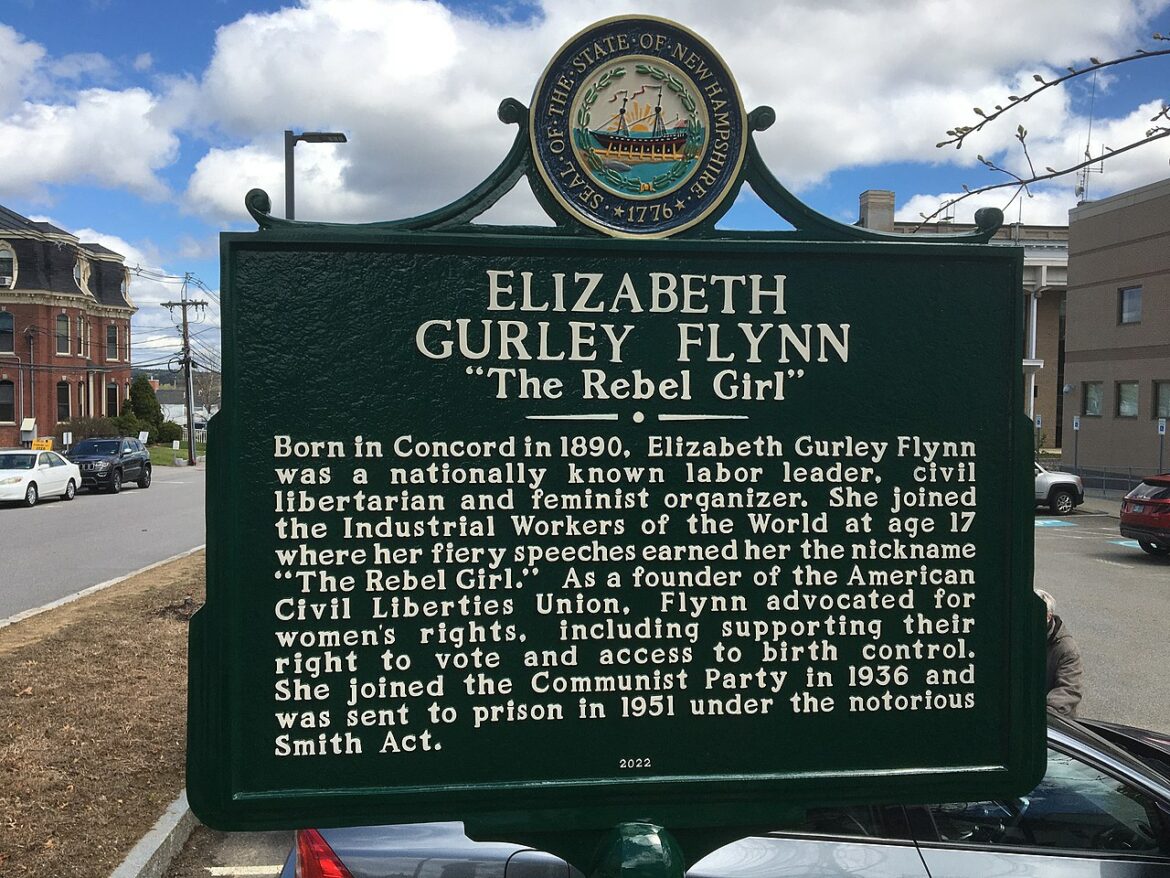By DAMIEN FISHER, InDepthNH.org
CONCORD – The Elizabeth Gurley Flynn saga continues as lawyers for the Department of Natural and Cultural Resources argued that the lawsuit over her Historic Highway Marker ought to be dismissed.
“If the DNCR changes its mind, the state has every right to take that marker down,” attorney Michael DeGrandis said Wednesday.
Activists Arnie Alpert and Mary Lee Sargent brought the lawsuit in Merrimack Superior Court in Concord after they worked to get the DNCR to approve the marker for Flynn, only to see it taken down amid political controversy due to Flynn’s Communist affiliation.
Flynn, a labor activist, women’s rights pioneer, and founding member of the American Civil Liberties Union, was born in Concord in 1890. She was also an American Communist leader who had joined the party in 1936 and became its chairman in 1961.
Alpert and Sargent’s attorney, Andru Volinsky, said the sign honored an important figure from New Hampshire history, and not the Communist Party.
“The placement of this sign doesn’t mean ‘we like Communists,’ it’s a matter of historic fact,” Volinsky said.
Judge John Kissinger heard both sides Wednesday on the state’s motion to dismiss the case. Alpert and Sargent argued the state violated its own rules when it took the marker down.
Volinsky claimed text messages from DNCR staff indicate pressure from Gov. Chis Sununu forced the marker’s removal. He wants to see the case move to the discovery phase where he is sure more evidence of Sununu’s politicking will emerge.
“Somebody in particular made this decision,” Volinsky said.
When the marker was unveiled on May 1 of last year it kicked off a firestorm of political controversy. Both Sununu and Republican Executive Councilor Joe Kenney demanded it be removed. Sununu vowed to find a way to get it taken down. The marker ended up coming down on May 12.
But DeGrandis said it does not matter if staff at DNCR or Sununu caused the marker to be removed. The marker was paid for by the state, put on state property, and was set to be maintained by the state. It’s within the state’s rights to remove the marker no matter who made the decision, DeGrandis said.
“The DNCR does not owe any duty to the sponsors of a historic marker,” DeGrandis said.
Kissinger asked if there is any check on a governor’s authority to remove historic markers he does not like, or if New Hampshire governors are able to remove all markers if they choose.
“Politics,” DeGrandis replied.
Since the state has discretion about the marker program, and the governor is the chief executive, the ultimate authority rests in the corner office, DeGrandis said.
DeGrandis conceded that Kissinger could order the DNCR to review the process used to remove a particular marker, and order that the process specified by DNCR’s rules be adhered to. However, Kissinger could not order that the marker be put back up.
Volinsky understands he’s unlikely to get a ruling to have the marker reinstated, but he wants the state held to account for breaking its rules.
“We would be tickled pink if you ruled they were wrong,” Volinsky said.
Disclaimer: Arnie Alpert writes a column for InDepthNH.org and attorney Andru Volinsky represents the news outlet in a lawsuit seeking all the names of police officers on the Laurie List, or Exculpatory Evidence Schedule.





